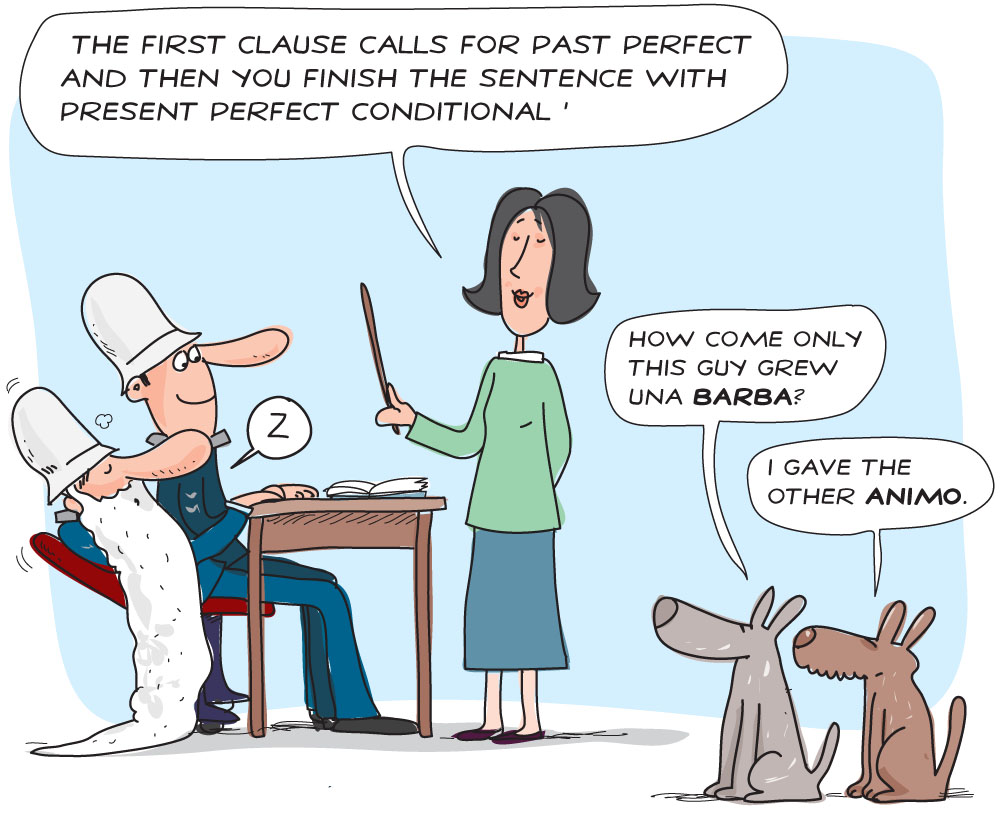Giancarlo, the affable man with whom I team teach, recently took off for Japan on what he described as a ‘mother-in-law mission’. ‘Japanese women like Italian men,’ he said to justify the absence. I believe his time off is better justified by the fact that his future mother-in-law still had no idea she soon will be one. Yet, as Giancarlo abandoned ship to take a plane, I was left solo to lead a week-long course for vigili urbani, whom, I reckon, enjoyed English lessons as much as you and I like traffic tickets. Theirs is always an annual seven-hour-a-day shindig and when we’re through with them, we’re lucky if the participants remember their names, much less ‘My name is…’.
The Flemish fellow in Strasbourg who pays for the course with European money is likely not aware that our traffic cops come to us prepared for little more than a game of Twister. In other words, their linguistic comfort zone is delineated by words like ‘red’, ‘green’ and maybe ‘yellow’. But, even if this group had been well-versed on the whole of the rainbow, I still would have been secretly opposed to strictly following the EU program. Discussing the Third Conditional by Day Three is nothing short of sadistic. The Flemish should face it: cops don’t need the grammar used for expressing regret; they just need to make others feel regretful.
The good news is that when Italians think you’re as dull as dishwater, they huff until no strength is left in their lungs and employ exclamations that are a far cry from boring. Last week’s most well worn phrase became: ‘Profe, questa roba è una barba, this stuff is a beard.’ Put the sentence into your Google Translating Bar and you’ll likely get: Hey Teach, I’m growing me-self a wee bit of beard here. And time’s a-passin’ so slow and boring-like, that I’ll soon be as old and shaggy as my Nonno Mario.’
We all aged at least two centuries in one week’s time, and that was the confession I made to Giancarlo once he was back in town and curious for a lowdown.
‘So, you aged 200 years?’
‘Yes, they said I was una barba.’
He cracked a smile. ‘You or the grammar?’
‘Both of us. But then, to be more beardless, I gave them Argentinian tea to boost their immune systems. And things got much better after asking them to translate Neil Diamond’s version of Mr. Bojangles.
‘Mr. who?’
‘Bo-jangles. It’s a song about a dancing convict. Even just the name can perk you up.’
Giancarlo shook his head. ‘Brussels is going to fire you.’ A pause and then, ‘And what is “perk up?”’
‘Ti da animo.’

Between you and me, this last exchange is the very reason Giancarlo and I are never forced to resort to boredom expressions of our very own. It is also the reason I would be really remorseful if Brussels were indeed to give me the sack. The two of us are co-teachers and co-dependent language devotees. He immediately wanted to know if ‘perk up’ was akin to percolated coffee. And did that explain why the phrase implies a caffeine high? On my end, I had never before considered the energizing Italian expression darsi animo, which roughly means ‘to give oneself soul or spirit’. I challenge every country on the map to find a lovelier way to say ‘to liven up’ or ‘find inner courage’. Leave it to the Italians to make ‘soul’ a verb.
‘Speaking of darsi animo,’ I started, ‘how was your mother-in-law mission?’
My friend shook his head again. ‘She told me I was a hoo-hige.’
‘What’s that?’
‘Una barba in giapponese.’
‘She did not!’
‘No,’ he admitted. ‘But her silence said it. At least, I think it did. I’m not really fluent in silence.’
Neither am I, so we thought together, in silence. ‘If it’s any consolation,’ I finally ventured, ‘To me, you seem to be more of a moustache man.’
Giancarlo laughed. Not a discrete, hand-over-the-mouth Japanese chuckle, it was a soul-feeding, rounded Italian laugh—the very kind that engenders animo. It made me think there’s truth in Giancarlo’s theory and might be precisely why Japanese women like Italian men so much.








